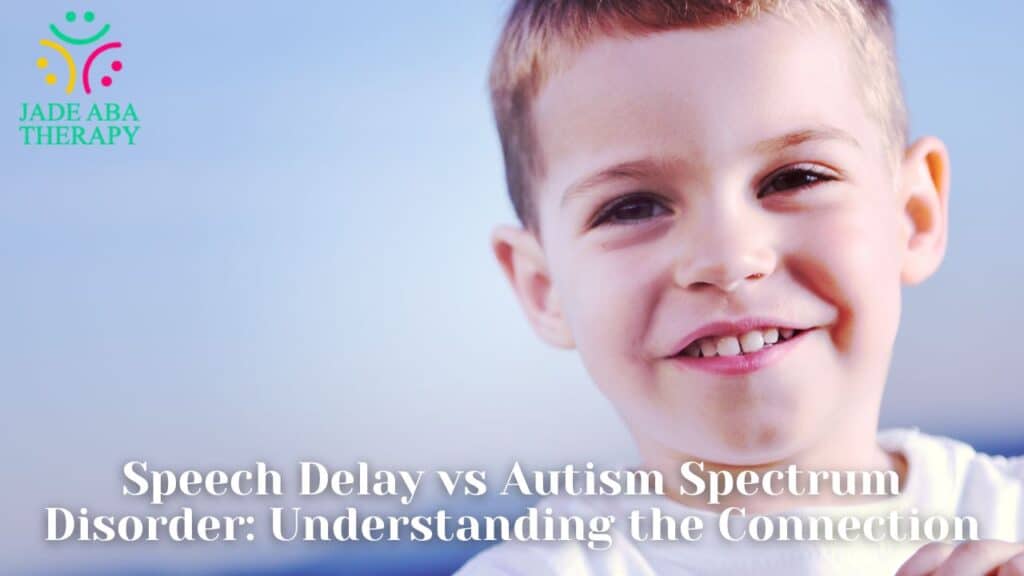Speech and language delays are common in children, especially those with autism spectrum disorder (ASD). However, not all children with speech delays have ASD. Understanding the differences can help parents identify potential issues and seek appropriate interventions. This comprehensive guide examines the link between delayed speech and autism, providing actionable advice for concerned parents. Speech delay vs autism are distinct yet sometimes overlapping conditions. Speech delay refers to a delay in the development of spoken language, often without other significant developmental issues.

What is Delayed Speech?
Delayed speech, also known as speech delay, refers to when a child’s speech development occurs later than average. On average, children say their first words around 12 months old and put two words together around 18-24 months. Delayed speech is diagnosed when a child has not reached these milestones by certain ages:
- No words by 16 months
- Less than 50 words or no two-word phrases by 24 months
- Difficulty understanding and using language by age 3
Delayed speech has many potential causes, including hearing problems, intellectual disabilities, autism spectrum disorder, childhood apraxia of speech, and environmental factors. Early intervention is key to helping children with speech delays develop language abilities.
Connection Between Delayed Speech and Autism
Many children with autism experience delayed speech and language skills. In fact, 25-30% of children with autism remain nonverbal. Children with autism tend to start speaking later, around age 3 or older. They also demonstrate difficulties using and understanding nonverbal communication.
However, not all children with delayed speech have autism. Approximately 15-20% of toddlers experience delayed speech without autism. Autism involves impairments in social communication and interaction, as well as restricted interests and repetitive behaviors.
There are some key differences between speech delays with and without autism:
Speech Delays Without Autism
- Child communicates through gestures, facial expressions, body language
- Engages with others through eye contact, pointing, showing
- Imitates actions and behaviors
- Enjoys social interactions like playing
Speech Delays With Autism
- Minimal nonverbal communication
- Avoids eye contact
- Doesn’t respond to their name
- Shows no interest in interacting with others
- Focuses excessively on objects
- Echolalia – repeating words or phrases
Understanding these differences can help identify when speech delays may indicate autism versus other issues. An autism evaluation is recommended whenever concerns arise.
Signs of Autism by Age
Autism symptoms can appear at different ages, though they generally surface in early childhood. Here are some red flags for autism spectrum disorder from ages 6 months to 2 years:
6-12 months:
- Lack of eye contact, smiling, or emotional response
- Does not respond to their name
- Fixated on objects
12 months:
- No babbling
- No gesturing or pointing
- No imitation
16 months:
- No single words
- Lack of showing or pointing to objects
24 months:
- No two-word phrases
- Minimal or no language
If a toddler is not meeting speech and communication milestones, an autism screening is recommended. Early intervention services can greatly help children with autism gain skills.
Additional Speech and Language Difficulties
Aside from delayed speech, children with autism often demonstrate other speech and language challenges:
- One-word speech or repetitive phrases
- Odd use of words or limited language comprehension
- Echolalia – repeating words or phrases heard
- Difficulty communicating needs, wants, or ideas
- Struggles understanding jokes, idioms, and nonliteral language
Around 25% of children with autism remain nonverbal. For those unable to speak, alternative communication methods like sign language, picture exchange systems, or speech-generating devices can help promote communication.
When to Seek Help for Delayed Speech
All children develop at different paces. But if your child is not reaching speech milestones, take action. Consult your pediatrician and have your child’s hearing tested. Ask for a speech-language evaluation or autism screening. With early intervention, many children make significant progress in language development.
Seeking help right away facilitates access to services like speech therapy, special education preschools, and applied behavior analysis (ABA) therapy. Support your child’s communication growth by reading together, narrating activities, and exposing them to new words.
Applied Behavior Analysis Therapy in Maryland
Applied behavior analysis (ABA) is the gold standard treatment for autism spectrum disorder. This evidence-based therapy uses positive reinforcement to teach skills and behaviors, ranging from communication to self-care. ABA can be extremely beneficial for children with autism who experience speech delays and language challenges.
Benefits of ABA Therapy Include:
- Improving language and communication abilities
- Increasing social skills
- Reducing problematic behaviors
- Fostering independence with daily living skills
Jade ABA Therapy Provides:
- Customized 1:1 ABA treatment based on your child’s needs
- Highly experienced and trained therapists
- Ongoing progress monitoring and parent involvement
- Fun sessions focused on real-life skills
- Flexible at-home or center-based options
If your child has autism and you live in Maryland, contact Jade ABA Therapy today. Our passionate team can help your child reach their full potential.
Call (410) 616-0901 or email info@jadeaba.org to get started.
The Takeaway
While many children with autism have delayed speech, not all late talkers have autism. There are key differences between speech delays with and without autism. If your toddler is missing speech milestones, have them evaluated and seek early intervention services like speech therapy or ABA. With the right support, children can make remarkable progress in language and communication.
References
[1] Autism Speaks. “When Should I Be Concerned?” Autism Speaks, https://www.autismspeaks.org/when-should-i-be-concerned. Accessed 28 Feb 2023.
[2] CDC. “Signs and Symptoms of Autism Spectrum Disorders.” Centers for Disease Control and Prevention, 15 Aug 2022, https://www.cdc.gov/ncbddd/autism/signs.html. Accessed 28 Feb 2023.
[3] ASHA. “Speech and Language Developmental Milestones.” American Speech-Language-Hearing Association, https://www.asha.org/public/speech/developmental-milestones/. Accessed 28 Feb 2023.
[4] Kryzak, Laurie A. and Jones, Emily A. “The Role of ABA in Promoting Language in Learners with Autism.” Journal of Speech-Language Pathology and Applied Behavior Analysis, vol. 11, no. 2, 2016, pp. 7–13., https://meridian.allenpress.com/jslpa-ba/article/11/2/7/44/html. Accessed 28 Feb 2023.